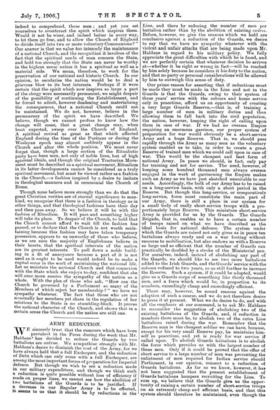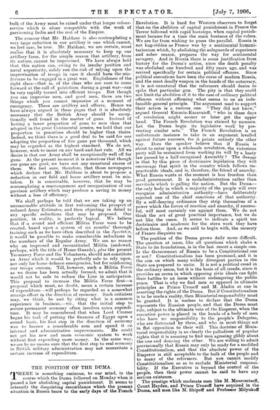ARMY REDUCTION.
WE sincerely trust that the rumours which have been prevalent in the Press during the week that Mr. Haldane' has decided to reduce the Guards by two battalions are untrue. We svmpathise strongly with Mr. Haldane's desire to diminish the cost of the Army, for we have always held that a full Exchequer, and the reduction of Debt which can only come with a full Exchequer, are among the most important forms of preparation for Imperial defence. But though we wish to see a reduction made in our military expenditure, and though we think such a reduction is quite possible without loss of efficiency if made on proper lines, we cannot see how the abolition of two battalions of the Guards is to be justified. If a 'decrease in our Regular Army is to be effected, it seems to us that it should be by reductions in the Line, and there by reducing the number of men per battalion rather than by the abolition of existing cadres. Before, however, we give the reasons which we hold are conclusive against a reduction of the Guards, we desire to say that we have no sympathy whatever with the violent and unfair attacks that are being made upon Mr. Haldane in regard to his military policy. We fully appreciate the great difficulties with which he is faced, and we are perfectly certain that whatever decision he arrives at—whether it be right or wrong in fact—will be reached by him solely because he considers it his duty to the nation, and that no party or personal considerations will be allowed by him to outweigh this sense of duty.
Our prime reason for asserting that if reductions must be made they must be made in the Line and not in the Guards is that the Guards, owing to their system of three years' service with the colours and home service only in peacetime, afford us an opportunity of creating a very large Guards Reserve,—that is, of training a large number of men in military duties and then allowing them to fall back into the civil population, the nation, however, keeping the right of calling upon them in case of war. If we had no oversea Empire requiring an enormous garrison, our proper system of preparation for war would obviously be a short-service Army and a huge Reserve. That is, we should pass rapidly through the Army as many men as the voluntary system enabled us to take, in order to create a great Reserve of trained men which we could call upon in ease of war. This would be the cheapest and best form of national Army. In peace we should, in fact, only pay for training and not for service. The need, however, of keeping some hundred thousand men always oversea engaged in the work of garrisoning the Empire makes such an Army as we have just sketched unsuitable to our needs. Accordingly, the bulk of our Army has to be raised on a long-service basis, with only a short period in the Reserve. But though this long-service, or comparatively long-service, force must constitute the main part of our Army, there is still a place in our system for a small body of really short-service troops with a pro- portionately large Reserve. This miniature short-service Army is provided for us by the Guards. The Guards Brigade, that is, enables us to have a certain number of troops raised on what we have described as the ideal basis for national defence. The system under which the Guards are raised not only gives us in peace ten battalions always ready and on a war footing without recourse to mobilisation, but also endows us with a Reserve so large and so efficient that the number of Guards can practically be doubled by a stroke of the Ministerial pen. For ourselves, indeed, instead of abolishing any part of the Guards, we should like to see two more battalions added to the Irish Guards, and the Guards' service with the colours reduced to two years, so as still further to increase the Reserve. Such a system, if it could be adopted, would give us a Guards corps of something like thirty thousand men, and a force which would be, in proportion to its numbers, exceedingly cheap and exceedingly efficient.
There may, however, be sound reasons against the adoption of such a course, and we do not therefore desire to press it at present. What we do desire to do, and with all the emphasis at our command, is to ask Mr. Haldane to reconsider the suggestion of abolishing two of the existing battalions of the Guards, and, if reduction in numbers there must be, to abolish two of the extra Line battalions raised during the war. Remember that the Reserve man is the cheapest soldier we can have, because, except for his very small Reserve pay, he maintains him- self in peacetime, and yet is ready for war service if called upon. To abolish Guards battalions is to abolish the force which provides us with the largest number of these men. Only if it could be proved that the offer of short service to a large number of men was preventing the enlistment of men required for Indian service should Parliament, in our opinion, consent to a reduction of Guards battalions. As far as we know, however, it has not been suggested that the present establishment of Guards battalions hampers recruiting for the Line. To sum up, we believe that the Guards give us the oppor- tunity of raising a certain number of short-service troops on an extremely cheap and efficient basis, and that this system should therefore be maintained, even though the bulk of the Army must be raised under that longer colour- service which is alone compatible with the work of garrisoning India and the rest of the Empire.
The rumour that Mr. Haldane is also contemplating a very large reduction in our artillery is one which cannot, we feel sure, be true. Mr. Haldane, we are certain, must realise that it is absolutely necessary to keep up our artillery force, for the simple reason that artillery, from its nature, cannot be improvised. We have always held that this nation can, owing to its insular position and naval superiority, safely run the risk of relying upon the improvisation of troops in case it should have the mis- fortune to be engaged in a great war. Englishmen of the right class—that is, of the class who are sure to come forward at the call of patriotism during a great war—can be very rapidly turned into efficient troops. But though you can improvise men, and good men, there are two things which you cannot improvise at a moment of emergency. These are artillery and officers. Hence we have always argued in these pages that it is absolutely necessary that the British Army should be excep- tionally well found in the matter of guns. Instead of having a lower proportion of guns to men than that adopted in the great Continental armies, we hold that our proportion in peacetime should be higher than theirs. Indeed, we think there is a good deal to be said for our adopting the proportion of five guns per thousand, which may be regarded as the highest standard. We do not, however, wish to insist on any hard-and-fast rule. All we desire is that our Army shall be exceptionally well off for guns. At the present moment it is notorious that though our guns are good, we have not any unnatural excess of them. We feel sure, therefore, that those newspapers which declare that Mr. Haldane is about to propose a reduction in our field and horse artillery must be mis- taken. It is conceivable, however, that he may be contemplating a rearrangement and reorganisation of our garrison artillery which may produce a saving in money without a loss of efficiency.
We shall perhaps be told that we are taking up an unreasonable attitude in first welcoming the prospect of reduced Army Estimates, and then objecting in detail to any specific reductions that may be proposed. Our position, iii reality, is perfectly logical. We believe that if a sound and efficient Militia Force were to be created, based upon a system of six months' thorough training such as we have often described in the Spectatcr, it would be possible to make considerable reductions in the numbers of the Regular Army. We see no reason why an improved and reconstituted Militia (endowed, perhaps, with the title of Home Guards), plus the present 'Yeomanry Force and the Volunteers, should not constitute an Army which it would be perfectly safe to rely upon, not only for home defence emergencies, but for reinforcing our troops oversea. Till, however, such a Militia Force as we desire has been actually formed, we admit that it would not be safe to reduce the Line in anticipation. This proposal to increase the Militia Force first—a proposal which must, no doubt, mean a certain increase of expenditure—will perhaps be regarded as a somewhat strange effort in the direction of economy. Such criticism may, we think, be met by citing what is a common experience in business,—viz., that the initial step to secure permanent economy often involves extra expendi- ture. It may be remembered that when Lord Cromer began his task of putting the finances of Egypt upon a sound basis, his first step in the direction of economy was to borrow a considerable sum and spend it on internal and administrative improvements. He could not get his new and more economic system to work without first expending more money. In the same way, we are by no means sure that the first step to real economy in British military administration may not necessitate a certain increase of expenditure.



















































 Previous page
Previous page